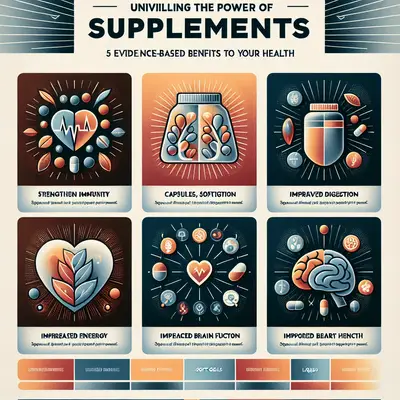Your Body's Absorption Rate Varies
Many people believe that the body can absorb all the nutrients from a supplement at once, but this isn’t quite accurate. The body’s ability to absorb nutrients depends on several factors, including the type of nutrient, the other foods consumed at the same time, and the individual's digestive health. For instance, fat-soluble vitamins like Vitamins A, D, E, and K are best absorbed when taken with a meal that contains fats[^1^].
Not All Supplements Are Created Equal
Just like with any product, the quality of supplements can vary greatly. Factors such as the manufacturing process, the source of ingredients, and the presence of fillers can impact the effectiveness of a supplement[^2^]. Always opt for products from trusted, transparent brands that are willing to share their manufacturing processes and ingredient sources.
Timing Matters
The timing of when you consume your supplements can impact their effectiveness. For example, some nutrients, like B vitamins, are best taken in the morning as they can boost energy levels and potentially interfere with sleep if taken late in the day[^3^]. On the other hand, some supplements, such as magnesium, may help with relaxation and sleep and are often recommended for evening consumption[^4^].
Supplements Can Interact with Medications
If you're taking any prescription medications, it's important to know that some supplements might interact with them, potentially altering their effectiveness[^5^]. Always consult your healthcare provider before starting a new supplement regimen, especially if you're on any long-term medication.
Supplements Should Complement a Balanced Diet
Supplements are intended to "supplement" a healthy diet, not replace it. While they can help fill nutrient gaps, they can't replicate all of the nutrients and benefits of whole foods[^6^]. A diet rich in fruits, vegetables, whole grains, and lean proteins should be your primary source of nutrients.
Conclusion
In the world of supplements, knowledge is power. Understanding the science behind your supplements can help you make informed decisions for your health. Remember, it's always best to consult with a healthcare provider before starting any new supplement regimen.
[^1^]: Harvard Health Publishing. (2019). Taking your vitamins? Timing and type matter. Harvard Health. https://www.health.harvard.edu/staying-healthy/taking-your-vitamins-timing-and-type-matter
[^2^]: NIH. (2021). Quality and Safety of Dietary Supplements. NIH Office of Dietary Supplements. https://ods.od.nih.gov/factsheets/DietarySupplements-Consumer/
[^3^]: NIH. (2021). B Vitamins. NIH Office of Dietary Supplements. https://ods.od.nih.gov/factsheets/BVitamins-HealthProfessional/
[^4^]: NIH. (2021). Magnesium. NIH Office of Dietary Supplements. https://ods.od.nih.gov/factsheets/Magnesium-HealthProfessional/
[^5^]: NIH. (2021). Prescription Medications and Dietary Supplements. NIH Office of Dietary Supplements. https://ods.od.nih.gov/factsheets/Medicine-HealthProfessional/
[^6^]: Harvard Health Publishing. (2019). Should you get your nutrients from food or from supplements? Harvard Health. https://www.health.harvard.edu/staying-healthy/should-you-get-your-nutrients-from-food-or-from-supplements



